Equity and Trust Law: UK Assignment on Trustee Responsibilities
VerifiedAdded on 2022/12/14
|18
|6250
|195
Homework Assignment
AI Summary
This assignment delves into the complexities of Equity and Trust Law in the UK, focusing on the responsibilities and duties of trustees. It examines key legal concepts, including the Trustee Act 2000, ethical investment, and fiduciary duty. The document analyzes the landmark case of Cowan v Scargill, exploring trustee investment discretion and the importance of considering beneficiaries' interests. It discusses the impact of environmental, social, and governance factors on investment decisions, as highlighted by the Law Commission in 2014. Furthermore, the assignment outlines the legal duties of trustees, including prudent investment, efficient management of trust funds, and the decision-making process involving suitability and diversification. The document also provides a comprehensive overview of trustee powers, such as the right to enter into transactions and delegate investment management functions. Overall, it provides a thorough analysis of the legal framework governing trustees and their responsibilities in managing trust assets effectively and ethically.
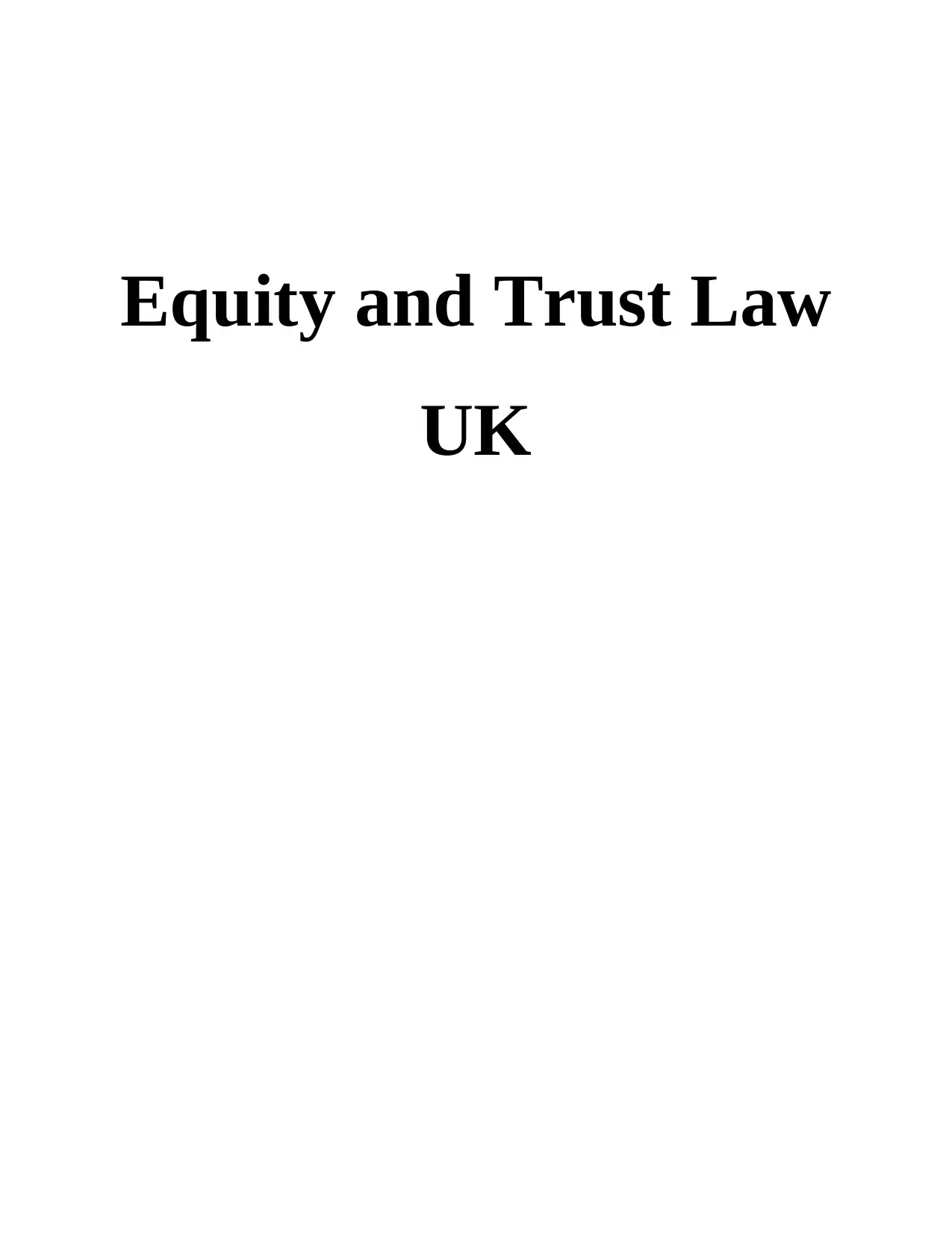
Equity and Trust Law
UK
UK
Paraphrase This Document
Need a fresh take? Get an instant paraphrase of this document with our AI Paraphraser
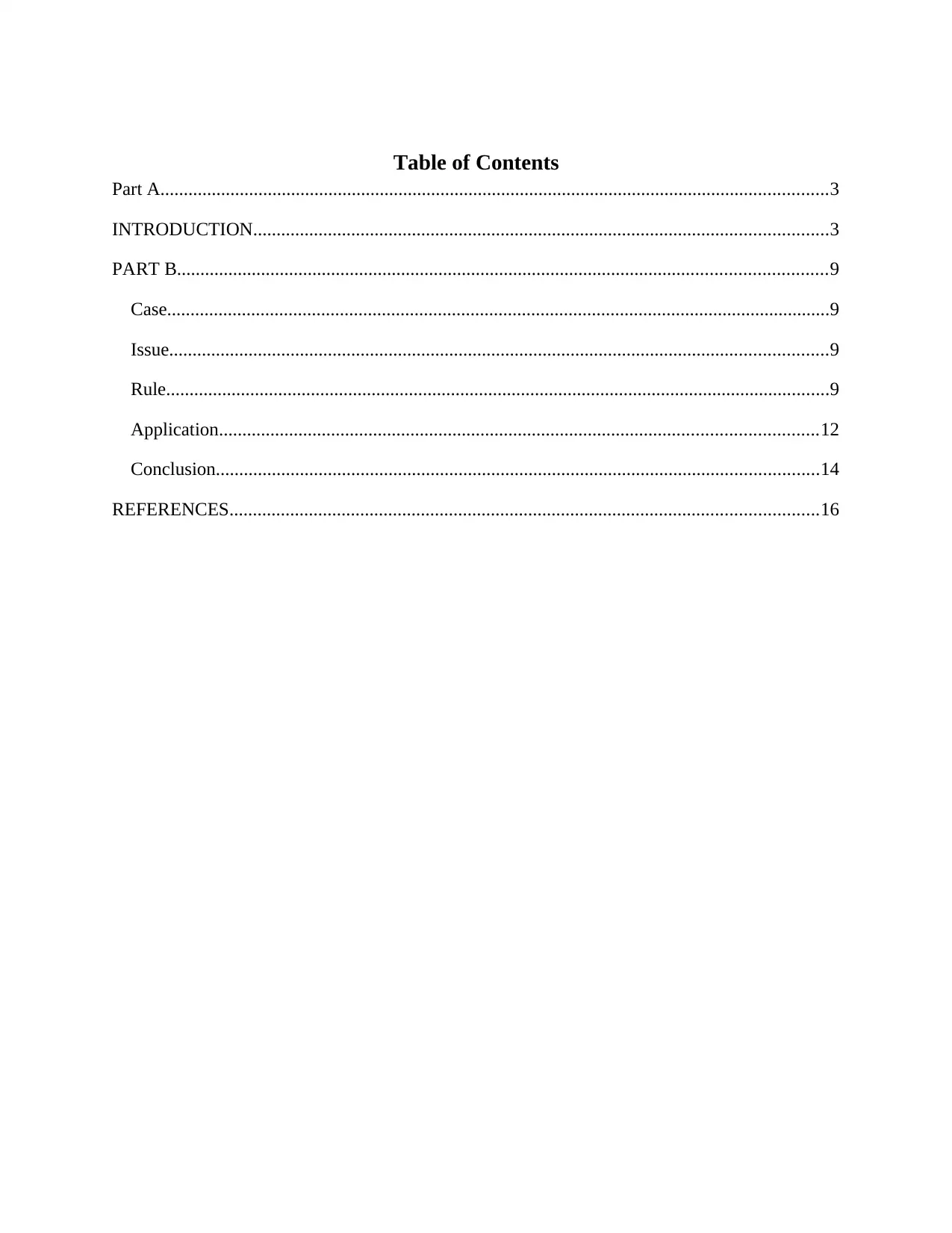
Table of Contents
Part A...............................................................................................................................................3
INTRODUCTION...........................................................................................................................3
PART B...........................................................................................................................................9
Case..............................................................................................................................................9
Issue.............................................................................................................................................9
Rule..............................................................................................................................................9
Application................................................................................................................................12
Conclusion.................................................................................................................................14
REFERENCES..............................................................................................................................16
Part A...............................................................................................................................................3
INTRODUCTION...........................................................................................................................3
PART B...........................................................................................................................................9
Case..............................................................................................................................................9
Issue.............................................................................................................................................9
Rule..............................................................................................................................................9
Application................................................................................................................................12
Conclusion.................................................................................................................................14
REFERENCES..............................................................................................................................16
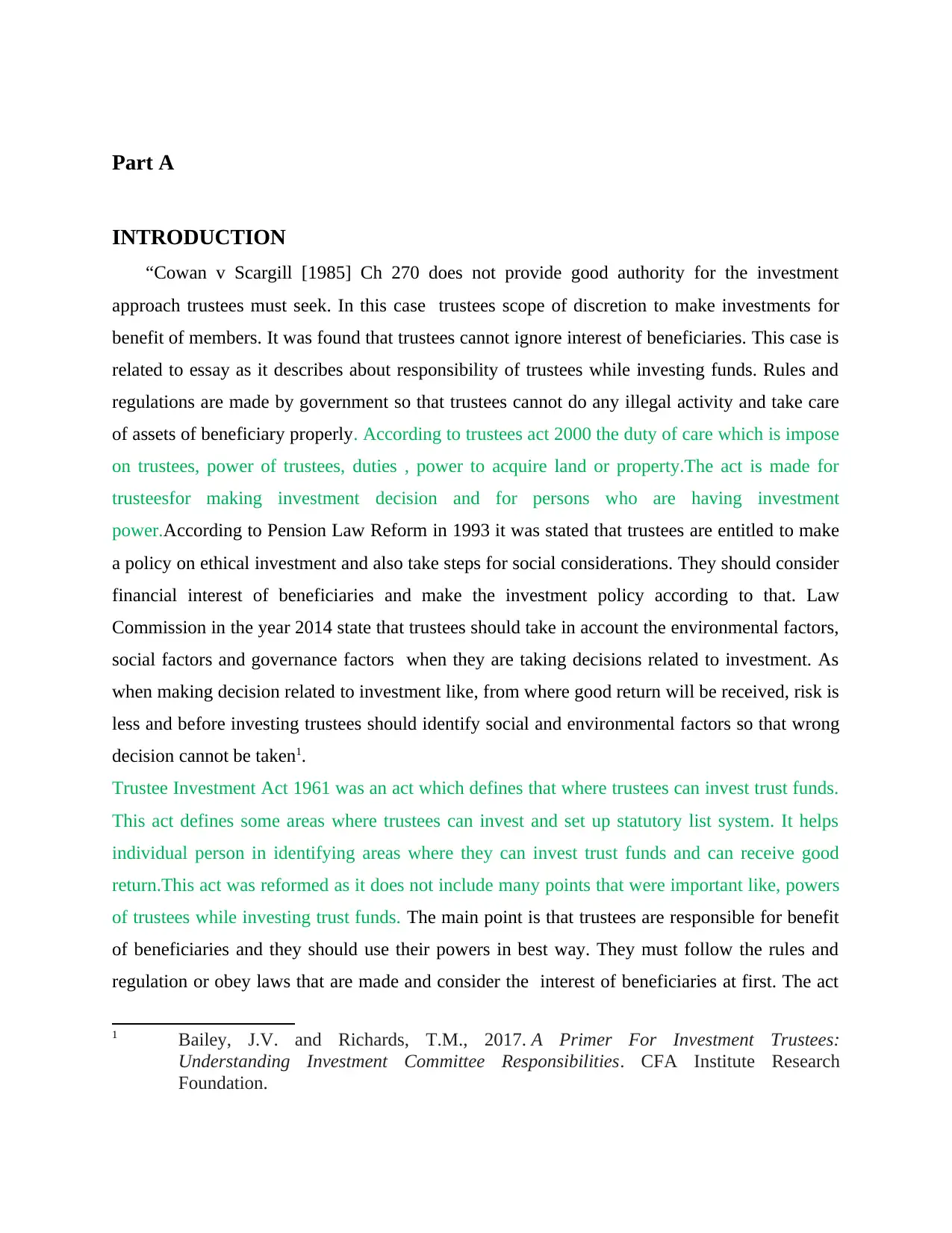
Part A
INTRODUCTION
“Cowan v Scargill [1985] Ch 270 does not provide good authority for the investment
approach trustees must seek. In this case trustees scope of discretion to make investments for
benefit of members. It was found that trustees cannot ignore interest of beneficiaries. This case is
related to essay as it describes about responsibility of trustees while investing funds. Rules and
regulations are made by government so that trustees cannot do any illegal activity and take care
of assets of beneficiary properly. According to trustees act 2000 the duty of care which is impose
on trustees, power of trustees, duties , power to acquire land or property.The act is made for
trusteesfor making investment decision and for persons who are having investment
power.According to Pension Law Reform in 1993 it was stated that trustees are entitled to make
a policy on ethical investment and also take steps for social considerations. They should consider
financial interest of beneficiaries and make the investment policy according to that. Law
Commission in the year 2014 state that trustees should take in account the environmental factors,
social factors and governance factors when they are taking decisions related to investment. As
when making decision related to investment like, from where good return will be received, risk is
less and before investing trustees should identify social and environmental factors so that wrong
decision cannot be taken1.
Trustee Investment Act 1961 was an act which defines that where trustees can invest trust funds.
This act defines some areas where trustees can invest and set up statutory list system. It helps
individual person in identifying areas where they can invest trust funds and can receive good
return.This act was reformed as it does not include many points that were important like, powers
of trustees while investing trust funds. The main point is that trustees are responsible for benefit
of beneficiaries and they should use their powers in best way. They must follow the rules and
regulation or obey laws that are made and consider the interest of beneficiaries at first. The act
1 Bailey, J.V. and Richards, T.M., 2017. A Primer For Investment Trustees:
Understanding Investment Committee Responsibilities. CFA Institute Research
Foundation.
INTRODUCTION
“Cowan v Scargill [1985] Ch 270 does not provide good authority for the investment
approach trustees must seek. In this case trustees scope of discretion to make investments for
benefit of members. It was found that trustees cannot ignore interest of beneficiaries. This case is
related to essay as it describes about responsibility of trustees while investing funds. Rules and
regulations are made by government so that trustees cannot do any illegal activity and take care
of assets of beneficiary properly. According to trustees act 2000 the duty of care which is impose
on trustees, power of trustees, duties , power to acquire land or property.The act is made for
trusteesfor making investment decision and for persons who are having investment
power.According to Pension Law Reform in 1993 it was stated that trustees are entitled to make
a policy on ethical investment and also take steps for social considerations. They should consider
financial interest of beneficiaries and make the investment policy according to that. Law
Commission in the year 2014 state that trustees should take in account the environmental factors,
social factors and governance factors when they are taking decisions related to investment. As
when making decision related to investment like, from where good return will be received, risk is
less and before investing trustees should identify social and environmental factors so that wrong
decision cannot be taken1.
Trustee Investment Act 1961 was an act which defines that where trustees can invest trust funds.
This act defines some areas where trustees can invest and set up statutory list system. It helps
individual person in identifying areas where they can invest trust funds and can receive good
return.This act was reformed as it does not include many points that were important like, powers
of trustees while investing trust funds. The main point is that trustees are responsible for benefit
of beneficiaries and they should use their powers in best way. They must follow the rules and
regulation or obey laws that are made and consider the interest of beneficiaries at first. The act
1 Bailey, J.V. and Richards, T.M., 2017. A Primer For Investment Trustees:
Understanding Investment Committee Responsibilities. CFA Institute Research
Foundation.
⊘ This is a preview!⊘
Do you want full access?
Subscribe today to unlock all pages.

Trusted by 1+ million students worldwide
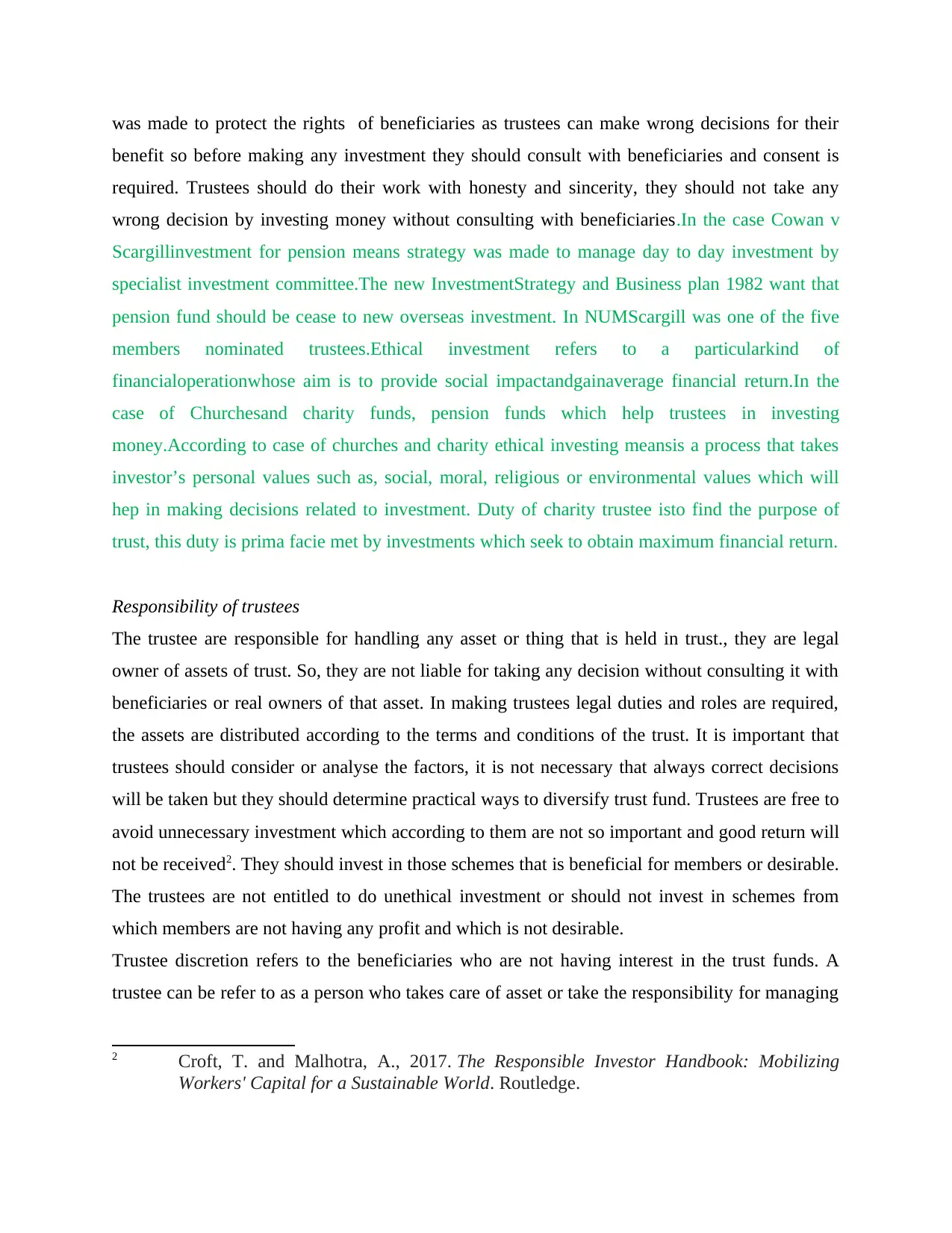
was made to protect the rights of beneficiaries as trustees can make wrong decisions for their
benefit so before making any investment they should consult with beneficiaries and consent is
required. Trustees should do their work with honesty and sincerity, they should not take any
wrong decision by investing money without consulting with beneficiaries.In the case Cowan v
Scargillinvestment for pension means strategy was made to manage day to day investment by
specialist investment committee.The new InvestmentStrategy and Business plan 1982 want that
pension fund should be cease to new overseas investment. In NUMScargill was one of the five
members nominated trustees.Ethical investment refers to a particularkind of
financialoperationwhose aim is to provide social impactandgainaverage financial return.In the
case of Churchesand charity funds, pension funds which help trustees in investing
money.According to case of churches and charity ethical investing meansis a process that takes
investor’s personal values such as, social, moral, religious or environmental values which will
hep in making decisions related to investment. Duty of charity trustee isto find the purpose of
trust, this duty is prima facie met by investments which seek to obtain maximum financial return.
Responsibility of trustees
The trustee are responsible for handling any asset or thing that is held in trust., they are legal
owner of assets of trust. So, they are not liable for taking any decision without consulting it with
beneficiaries or real owners of that asset. In making trustees legal duties and roles are required,
the assets are distributed according to the terms and conditions of the trust. It is important that
trustees should consider or analyse the factors, it is not necessary that always correct decisions
will be taken but they should determine practical ways to diversify trust fund. Trustees are free to
avoid unnecessary investment which according to them are not so important and good return will
not be received2. They should invest in those schemes that is beneficial for members or desirable.
The trustees are not entitled to do unethical investment or should not invest in schemes from
which members are not having any profit and which is not desirable.
Trustee discretion refers to the beneficiaries who are not having interest in the trust funds. A
trustee can be refer to as a person who takes care of asset or take the responsibility for managing
2 Croft, T. and Malhotra, A., 2017. The Responsible Investor Handbook: Mobilizing
Workers' Capital for a Sustainable World. Routledge.
benefit so before making any investment they should consult with beneficiaries and consent is
required. Trustees should do their work with honesty and sincerity, they should not take any
wrong decision by investing money without consulting with beneficiaries.In the case Cowan v
Scargillinvestment for pension means strategy was made to manage day to day investment by
specialist investment committee.The new InvestmentStrategy and Business plan 1982 want that
pension fund should be cease to new overseas investment. In NUMScargill was one of the five
members nominated trustees.Ethical investment refers to a particularkind of
financialoperationwhose aim is to provide social impactandgainaverage financial return.In the
case of Churchesand charity funds, pension funds which help trustees in investing
money.According to case of churches and charity ethical investing meansis a process that takes
investor’s personal values such as, social, moral, religious or environmental values which will
hep in making decisions related to investment. Duty of charity trustee isto find the purpose of
trust, this duty is prima facie met by investments which seek to obtain maximum financial return.
Responsibility of trustees
The trustee are responsible for handling any asset or thing that is held in trust., they are legal
owner of assets of trust. So, they are not liable for taking any decision without consulting it with
beneficiaries or real owners of that asset. In making trustees legal duties and roles are required,
the assets are distributed according to the terms and conditions of the trust. It is important that
trustees should consider or analyse the factors, it is not necessary that always correct decisions
will be taken but they should determine practical ways to diversify trust fund. Trustees are free to
avoid unnecessary investment which according to them are not so important and good return will
not be received2. They should invest in those schemes that is beneficial for members or desirable.
The trustees are not entitled to do unethical investment or should not invest in schemes from
which members are not having any profit and which is not desirable.
Trustee discretion refers to the beneficiaries who are not having interest in the trust funds. A
trustee can be refer to as a person who takes care of asset or take the responsibility for managing
2 Croft, T. and Malhotra, A., 2017. The Responsible Investor Handbook: Mobilizing
Workers' Capital for a Sustainable World. Routledge.
Paraphrase This Document
Need a fresh take? Get an instant paraphrase of this document with our AI Paraphraser
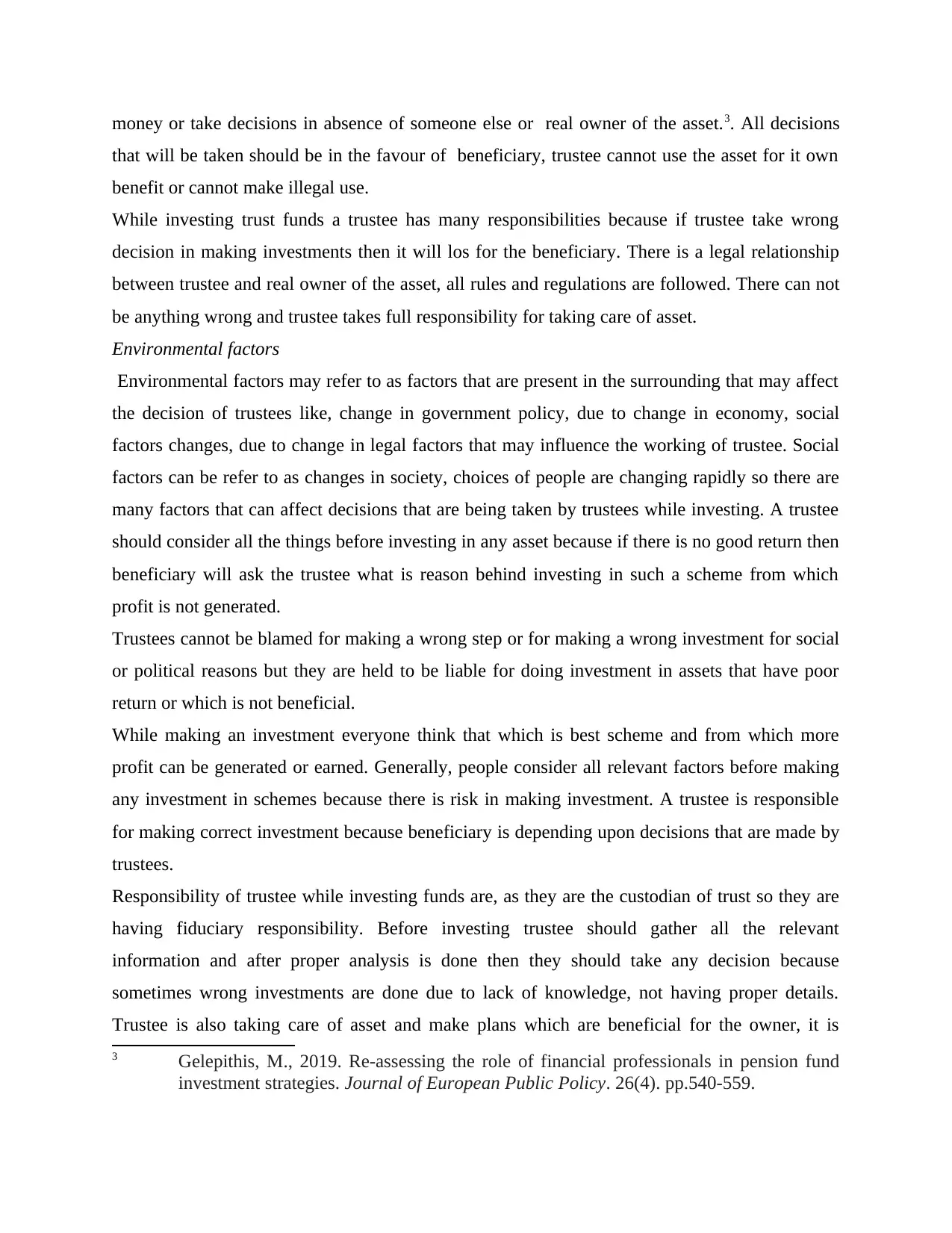
money or take decisions in absence of someone else or real owner of the asset.3. All decisions
that will be taken should be in the favour of beneficiary, trustee cannot use the asset for it own
benefit or cannot make illegal use.
While investing trust funds a trustee has many responsibilities because if trustee take wrong
decision in making investments then it will los for the beneficiary. There is a legal relationship
between trustee and real owner of the asset, all rules and regulations are followed. There can not
be anything wrong and trustee takes full responsibility for taking care of asset.
Environmental factors
Environmental factors may refer to as factors that are present in the surrounding that may affect
the decision of trustees like, change in government policy, due to change in economy, social
factors changes, due to change in legal factors that may influence the working of trustee. Social
factors can be refer to as changes in society, choices of people are changing rapidly so there are
many factors that can affect decisions that are being taken by trustees while investing. A trustee
should consider all the things before investing in any asset because if there is no good return then
beneficiary will ask the trustee what is reason behind investing in such a scheme from which
profit is not generated.
Trustees cannot be blamed for making a wrong step or for making a wrong investment for social
or political reasons but they are held to be liable for doing investment in assets that have poor
return or which is not beneficial.
While making an investment everyone think that which is best scheme and from which more
profit can be generated or earned. Generally, people consider all relevant factors before making
any investment in schemes because there is risk in making investment. A trustee is responsible
for making correct investment because beneficiary is depending upon decisions that are made by
trustees.
Responsibility of trustee while investing funds are, as they are the custodian of trust so they are
having fiduciary responsibility. Before investing trustee should gather all the relevant
information and after proper analysis is done then they should take any decision because
sometimes wrong investments are done due to lack of knowledge, not having proper details.
Trustee is also taking care of asset and make plans which are beneficial for the owner, it is
3 Gelepithis, M., 2019. Re-assessing the role of financial professionals in pension fund
investment strategies. Journal of European Public Policy. 26(4). pp.540-559.
that will be taken should be in the favour of beneficiary, trustee cannot use the asset for it own
benefit or cannot make illegal use.
While investing trust funds a trustee has many responsibilities because if trustee take wrong
decision in making investments then it will los for the beneficiary. There is a legal relationship
between trustee and real owner of the asset, all rules and regulations are followed. There can not
be anything wrong and trustee takes full responsibility for taking care of asset.
Environmental factors
Environmental factors may refer to as factors that are present in the surrounding that may affect
the decision of trustees like, change in government policy, due to change in economy, social
factors changes, due to change in legal factors that may influence the working of trustee. Social
factors can be refer to as changes in society, choices of people are changing rapidly so there are
many factors that can affect decisions that are being taken by trustees while investing. A trustee
should consider all the things before investing in any asset because if there is no good return then
beneficiary will ask the trustee what is reason behind investing in such a scheme from which
profit is not generated.
Trustees cannot be blamed for making a wrong step or for making a wrong investment for social
or political reasons but they are held to be liable for doing investment in assets that have poor
return or which is not beneficial.
While making an investment everyone think that which is best scheme and from which more
profit can be generated or earned. Generally, people consider all relevant factors before making
any investment in schemes because there is risk in making investment. A trustee is responsible
for making correct investment because beneficiary is depending upon decisions that are made by
trustees.
Responsibility of trustee while investing funds are, as they are the custodian of trust so they are
having fiduciary responsibility. Before investing trustee should gather all the relevant
information and after proper analysis is done then they should take any decision because
sometimes wrong investments are done due to lack of knowledge, not having proper details.
Trustee is also taking care of asset and make plans which are beneficial for the owner, it is
3 Gelepithis, M., 2019. Re-assessing the role of financial professionals in pension fund
investment strategies. Journal of European Public Policy. 26(4). pp.540-559.
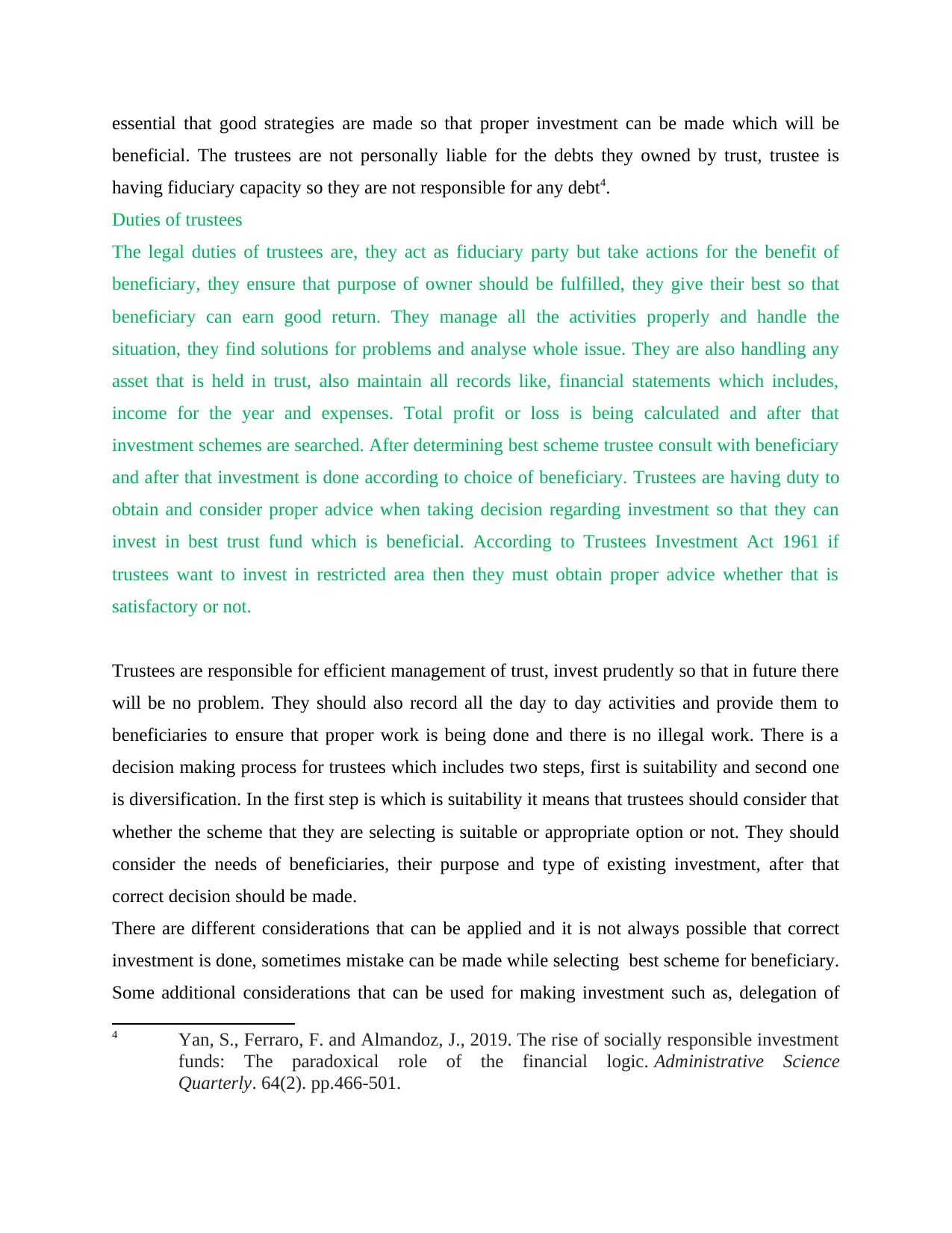
essential that good strategies are made so that proper investment can be made which will be
beneficial. The trustees are not personally liable for the debts they owned by trust, trustee is
having fiduciary capacity so they are not responsible for any debt4.
Duties of trustees
The legal duties of trustees are, they act as fiduciary party but take actions for the benefit of
beneficiary, they ensure that purpose of owner should be fulfilled, they give their best so that
beneficiary can earn good return. They manage all the activities properly and handle the
situation, they find solutions for problems and analyse whole issue. They are also handling any
asset that is held in trust, also maintain all records like, financial statements which includes,
income for the year and expenses. Total profit or loss is being calculated and after that
investment schemes are searched. After determining best scheme trustee consult with beneficiary
and after that investment is done according to choice of beneficiary. Trustees are having duty to
obtain and consider proper advice when taking decision regarding investment so that they can
invest in best trust fund which is beneficial. According to Trustees Investment Act 1961 if
trustees want to invest in restricted area then they must obtain proper advice whether that is
satisfactory or not.
Trustees are responsible for efficient management of trust, invest prudently so that in future there
will be no problem. They should also record all the day to day activities and provide them to
beneficiaries to ensure that proper work is being done and there is no illegal work. There is a
decision making process for trustees which includes two steps, first is suitability and second one
is diversification. In the first step is which is suitability it means that trustees should consider that
whether the scheme that they are selecting is suitable or appropriate option or not. They should
consider the needs of beneficiaries, their purpose and type of existing investment, after that
correct decision should be made.
There are different considerations that can be applied and it is not always possible that correct
investment is done, sometimes mistake can be made while selecting best scheme for beneficiary.
Some additional considerations that can be used for making investment such as, delegation of
4 Yan, S., Ferraro, F. and Almandoz, J., 2019. The rise of socially responsible investment
funds: The paradoxical role of the financial logic. Administrative Science
Quarterly. 64(2). pp.466-501.
beneficial. The trustees are not personally liable for the debts they owned by trust, trustee is
having fiduciary capacity so they are not responsible for any debt4.
Duties of trustees
The legal duties of trustees are, they act as fiduciary party but take actions for the benefit of
beneficiary, they ensure that purpose of owner should be fulfilled, they give their best so that
beneficiary can earn good return. They manage all the activities properly and handle the
situation, they find solutions for problems and analyse whole issue. They are also handling any
asset that is held in trust, also maintain all records like, financial statements which includes,
income for the year and expenses. Total profit or loss is being calculated and after that
investment schemes are searched. After determining best scheme trustee consult with beneficiary
and after that investment is done according to choice of beneficiary. Trustees are having duty to
obtain and consider proper advice when taking decision regarding investment so that they can
invest in best trust fund which is beneficial. According to Trustees Investment Act 1961 if
trustees want to invest in restricted area then they must obtain proper advice whether that is
satisfactory or not.
Trustees are responsible for efficient management of trust, invest prudently so that in future there
will be no problem. They should also record all the day to day activities and provide them to
beneficiaries to ensure that proper work is being done and there is no illegal work. There is a
decision making process for trustees which includes two steps, first is suitability and second one
is diversification. In the first step is which is suitability it means that trustees should consider that
whether the scheme that they are selecting is suitable or appropriate option or not. They should
consider the needs of beneficiaries, their purpose and type of existing investment, after that
correct decision should be made.
There are different considerations that can be applied and it is not always possible that correct
investment is done, sometimes mistake can be made while selecting best scheme for beneficiary.
Some additional considerations that can be used for making investment such as, delegation of
4 Yan, S., Ferraro, F. and Almandoz, J., 2019. The rise of socially responsible investment
funds: The paradoxical role of the financial logic. Administrative Science
Quarterly. 64(2). pp.466-501.
⊘ This is a preview!⊘
Do you want full access?
Subscribe today to unlock all pages.

Trusted by 1+ million students worldwide
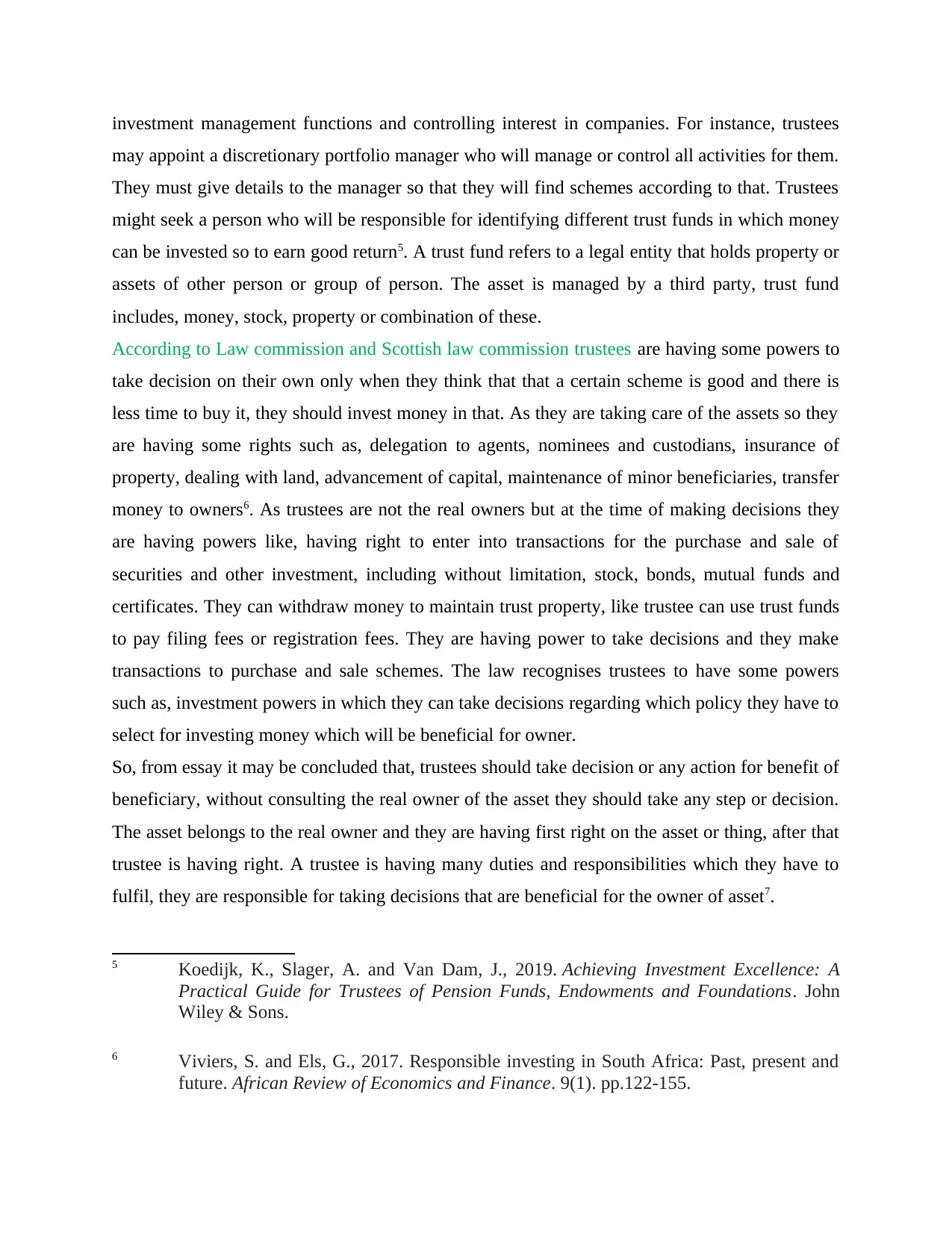
investment management functions and controlling interest in companies. For instance, trustees
may appoint a discretionary portfolio manager who will manage or control all activities for them.
They must give details to the manager so that they will find schemes according to that. Trustees
might seek a person who will be responsible for identifying different trust funds in which money
can be invested so to earn good return5. A trust fund refers to a legal entity that holds property or
assets of other person or group of person. The asset is managed by a third party, trust fund
includes, money, stock, property or combination of these.
According to Law commission and Scottish law commission trustees are having some powers to
take decision on their own only when they think that that a certain scheme is good and there is
less time to buy it, they should invest money in that. As they are taking care of the assets so they
are having some rights such as, delegation to agents, nominees and custodians, insurance of
property, dealing with land, advancement of capital, maintenance of minor beneficiaries, transfer
money to owners6. As trustees are not the real owners but at the time of making decisions they
are having powers like, having right to enter into transactions for the purchase and sale of
securities and other investment, including without limitation, stock, bonds, mutual funds and
certificates. They can withdraw money to maintain trust property, like trustee can use trust funds
to pay filing fees or registration fees. They are having power to take decisions and they make
transactions to purchase and sale schemes. The law recognises trustees to have some powers
such as, investment powers in which they can take decisions regarding which policy they have to
select for investing money which will be beneficial for owner.
So, from essay it may be concluded that, trustees should take decision or any action for benefit of
beneficiary, without consulting the real owner of the asset they should take any step or decision.
The asset belongs to the real owner and they are having first right on the asset or thing, after that
trustee is having right. A trustee is having many duties and responsibilities which they have to
fulfil, they are responsible for taking decisions that are beneficial for the owner of asset7.
5 Koedijk, K., Slager, A. and Van Dam, J., 2019. Achieving Investment Excellence: A
Practical Guide for Trustees of Pension Funds, Endowments and Foundations. John
Wiley & Sons.
6 Viviers, S. and Els, G., 2017. Responsible investing in South Africa: Past, present and
future. African Review of Economics and Finance. 9(1). pp.122-155.
may appoint a discretionary portfolio manager who will manage or control all activities for them.
They must give details to the manager so that they will find schemes according to that. Trustees
might seek a person who will be responsible for identifying different trust funds in which money
can be invested so to earn good return5. A trust fund refers to a legal entity that holds property or
assets of other person or group of person. The asset is managed by a third party, trust fund
includes, money, stock, property or combination of these.
According to Law commission and Scottish law commission trustees are having some powers to
take decision on their own only when they think that that a certain scheme is good and there is
less time to buy it, they should invest money in that. As they are taking care of the assets so they
are having some rights such as, delegation to agents, nominees and custodians, insurance of
property, dealing with land, advancement of capital, maintenance of minor beneficiaries, transfer
money to owners6. As trustees are not the real owners but at the time of making decisions they
are having powers like, having right to enter into transactions for the purchase and sale of
securities and other investment, including without limitation, stock, bonds, mutual funds and
certificates. They can withdraw money to maintain trust property, like trustee can use trust funds
to pay filing fees or registration fees. They are having power to take decisions and they make
transactions to purchase and sale schemes. The law recognises trustees to have some powers
such as, investment powers in which they can take decisions regarding which policy they have to
select for investing money which will be beneficial for owner.
So, from essay it may be concluded that, trustees should take decision or any action for benefit of
beneficiary, without consulting the real owner of the asset they should take any step or decision.
The asset belongs to the real owner and they are having first right on the asset or thing, after that
trustee is having right. A trustee is having many duties and responsibilities which they have to
fulfil, they are responsible for taking decisions that are beneficial for the owner of asset7.
5 Koedijk, K., Slager, A. and Van Dam, J., 2019. Achieving Investment Excellence: A
Practical Guide for Trustees of Pension Funds, Endowments and Foundations. John
Wiley & Sons.
6 Viviers, S. and Els, G., 2017. Responsible investing in South Africa: Past, present and
future. African Review of Economics and Finance. 9(1). pp.122-155.
Paraphrase This Document
Need a fresh take? Get an instant paraphrase of this document with our AI Paraphraser
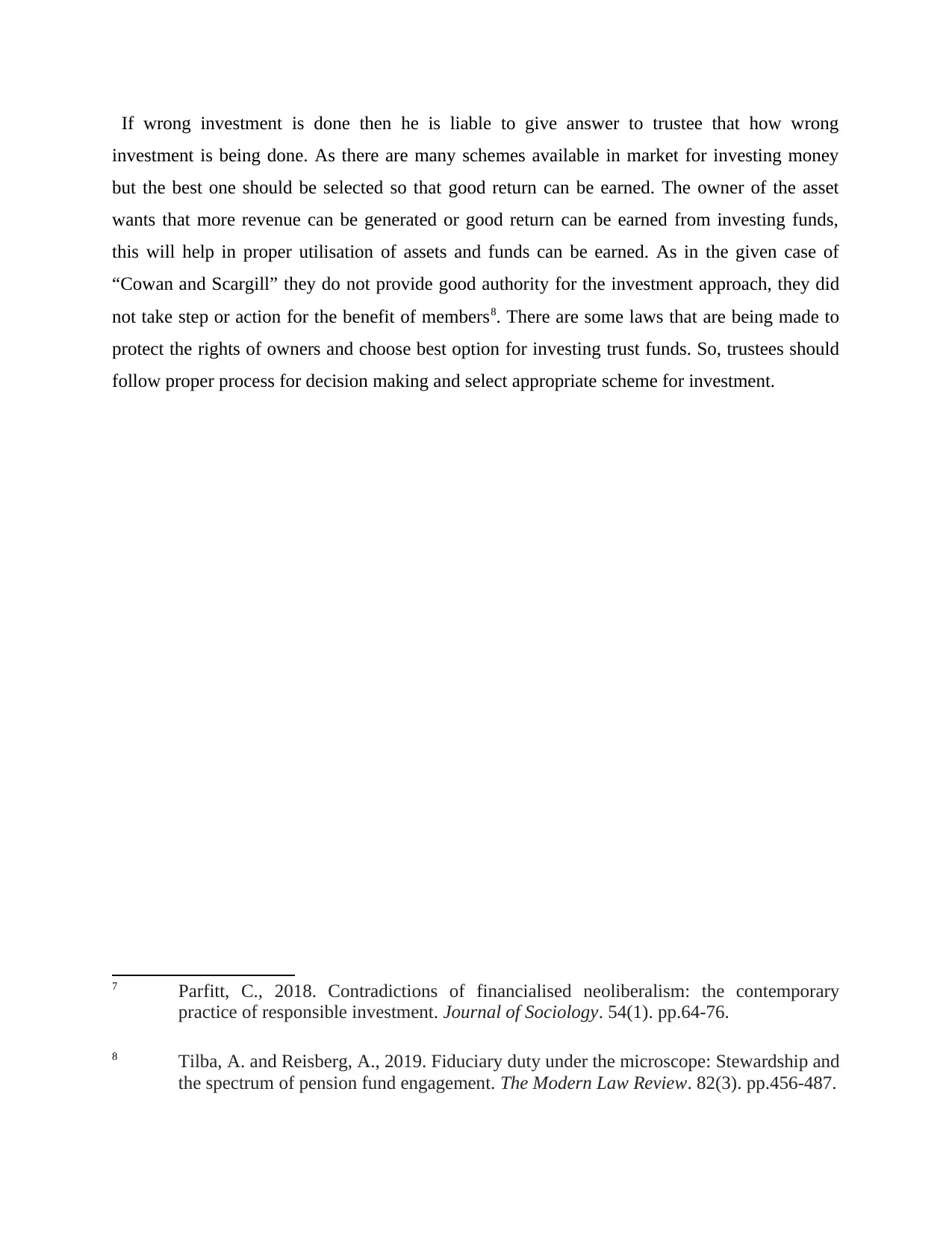
If wrong investment is done then he is liable to give answer to trustee that how wrong
investment is being done. As there are many schemes available in market for investing money
but the best one should be selected so that good return can be earned. The owner of the asset
wants that more revenue can be generated or good return can be earned from investing funds,
this will help in proper utilisation of assets and funds can be earned. As in the given case of
“Cowan and Scargill” they do not provide good authority for the investment approach, they did
not take step or action for the benefit of members8. There are some laws that are being made to
protect the rights of owners and choose best option for investing trust funds. So, trustees should
follow proper process for decision making and select appropriate scheme for investment.
7 Parfitt, C., 2018. Contradictions of financialised neoliberalism: the contemporary
practice of responsible investment. Journal of Sociology. 54(1). pp.64-76.
8 Tilba, A. and Reisberg, A., 2019. Fiduciary duty under the microscope: Stewardship and
the spectrum of pension fund engagement. The Modern Law Review. 82(3). pp.456-487.
investment is being done. As there are many schemes available in market for investing money
but the best one should be selected so that good return can be earned. The owner of the asset
wants that more revenue can be generated or good return can be earned from investing funds,
this will help in proper utilisation of assets and funds can be earned. As in the given case of
“Cowan and Scargill” they do not provide good authority for the investment approach, they did
not take step or action for the benefit of members8. There are some laws that are being made to
protect the rights of owners and choose best option for investing trust funds. So, trustees should
follow proper process for decision making and select appropriate scheme for investment.
7 Parfitt, C., 2018. Contradictions of financialised neoliberalism: the contemporary
practice of responsible investment. Journal of Sociology. 54(1). pp.64-76.
8 Tilba, A. and Reisberg, A., 2019. Fiduciary duty under the microscope: Stewardship and
the spectrum of pension fund engagement. The Modern Law Review. 82(3). pp.456-487.
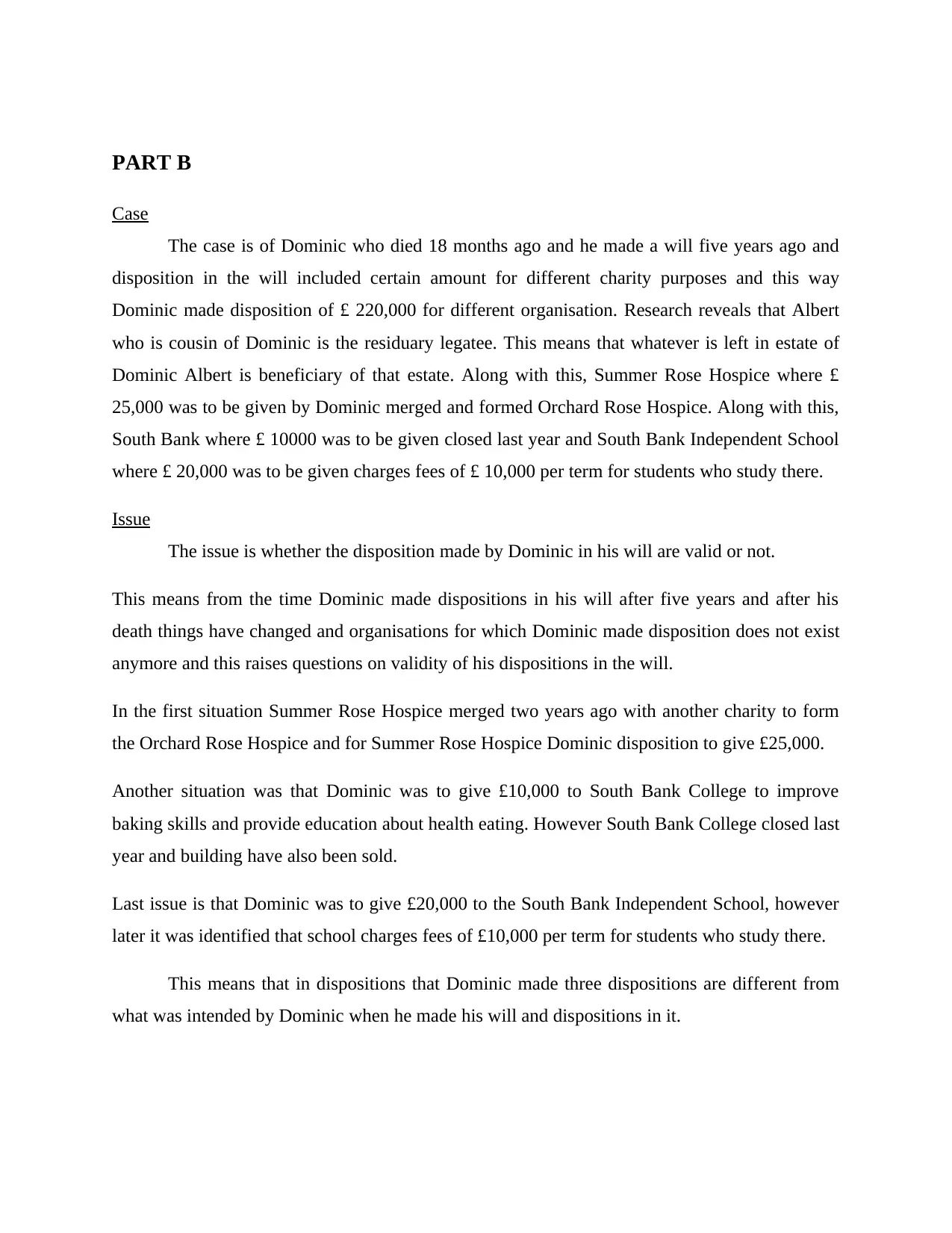
PART B
Case
The case is of Dominic who died 18 months ago and he made a will five years ago and
disposition in the will included certain amount for different charity purposes and this way
Dominic made disposition of £ 220,000 for different organisation. Research reveals that Albert
who is cousin of Dominic is the residuary legatee. This means that whatever is left in estate of
Dominic Albert is beneficiary of that estate. Along with this, Summer Rose Hospice where £
25,000 was to be given by Dominic merged and formed Orchard Rose Hospice. Along with this,
South Bank where £ 10000 was to be given closed last year and South Bank Independent School
where £ 20,000 was to be given charges fees of £ 10,000 per term for students who study there.
Issue
The issue is whether the disposition made by Dominic in his will are valid or not.
This means from the time Dominic made dispositions in his will after five years and after his
death things have changed and organisations for which Dominic made disposition does not exist
anymore and this raises questions on validity of his dispositions in the will.
In the first situation Summer Rose Hospice merged two years ago with another charity to form
the Orchard Rose Hospice and for Summer Rose Hospice Dominic disposition to give £25,000.
Another situation was that Dominic was to give £10,000 to South Bank College to improve
baking skills and provide education about health eating. However South Bank College closed last
year and building have also been sold.
Last issue is that Dominic was to give £20,000 to the South Bank Independent School, however
later it was identified that school charges fees of £10,000 per term for students who study there.
This means that in dispositions that Dominic made three dispositions are different from
what was intended by Dominic when he made his will and dispositions in it.
Case
The case is of Dominic who died 18 months ago and he made a will five years ago and
disposition in the will included certain amount for different charity purposes and this way
Dominic made disposition of £ 220,000 for different organisation. Research reveals that Albert
who is cousin of Dominic is the residuary legatee. This means that whatever is left in estate of
Dominic Albert is beneficiary of that estate. Along with this, Summer Rose Hospice where £
25,000 was to be given by Dominic merged and formed Orchard Rose Hospice. Along with this,
South Bank where £ 10000 was to be given closed last year and South Bank Independent School
where £ 20,000 was to be given charges fees of £ 10,000 per term for students who study there.
Issue
The issue is whether the disposition made by Dominic in his will are valid or not.
This means from the time Dominic made dispositions in his will after five years and after his
death things have changed and organisations for which Dominic made disposition does not exist
anymore and this raises questions on validity of his dispositions in the will.
In the first situation Summer Rose Hospice merged two years ago with another charity to form
the Orchard Rose Hospice and for Summer Rose Hospice Dominic disposition to give £25,000.
Another situation was that Dominic was to give £10,000 to South Bank College to improve
baking skills and provide education about health eating. However South Bank College closed last
year and building have also been sold.
Last issue is that Dominic was to give £20,000 to the South Bank Independent School, however
later it was identified that school charges fees of £10,000 per term for students who study there.
This means that in dispositions that Dominic made three dispositions are different from
what was intended by Dominic when he made his will and dispositions in it.
⊘ This is a preview!⊘
Do you want full access?
Subscribe today to unlock all pages.

Trusted by 1+ million students worldwide
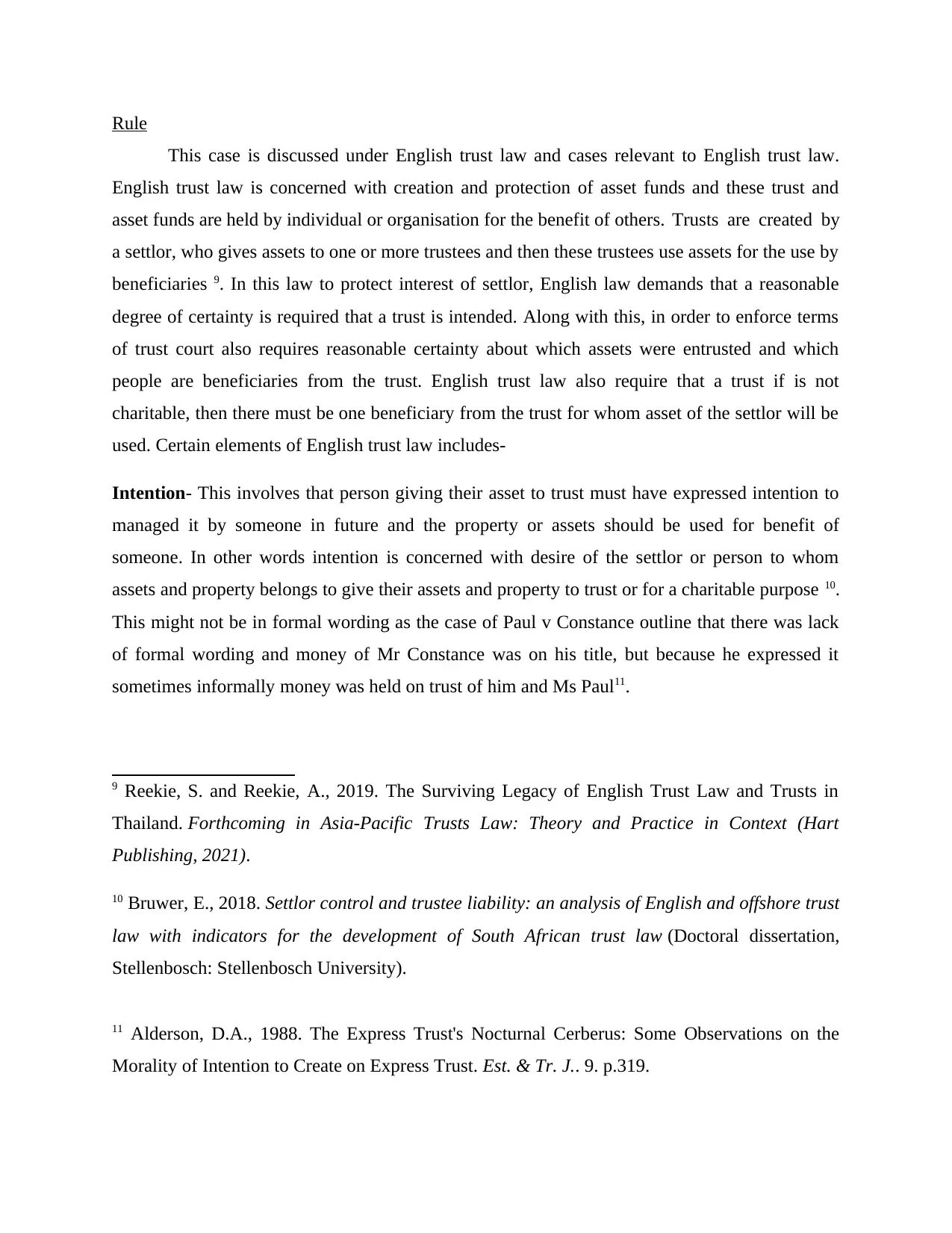
Rule
This case is discussed under English trust law and cases relevant to English trust law.
English trust law is concerned with creation and protection of asset funds and these trust and
asset funds are held by individual or organisation for the benefit of others. Trusts are created by
a settlor, who gives assets to one or more trustees and then these trustees use assets for the use by
beneficiaries 9. In this law to protect interest of settlor, English law demands that a reasonable
degree of certainty is required that a trust is intended. Along with this, in order to enforce terms
of trust court also requires reasonable certainty about which assets were entrusted and which
people are beneficiaries from the trust. English trust law also require that a trust if is not
charitable, then there must be one beneficiary from the trust for whom asset of the settlor will be
used. Certain elements of English trust law includes-
Intention- This involves that person giving their asset to trust must have expressed intention to
managed it by someone in future and the property or assets should be used for benefit of
someone. In other words intention is concerned with desire of the settlor or person to whom
assets and property belongs to give their assets and property to trust or for a charitable purpose 10.
This might not be in formal wording as the case of Paul v Constance outline that there was lack
of formal wording and money of Mr Constance was on his title, but because he expressed it
sometimes informally money was held on trust of him and Ms Paul11.
9 Reekie, S. and Reekie, A., 2019. The Surviving Legacy of English Trust Law and Trusts in
Thailand. Forthcoming in Asia-Pacific Trusts Law: Theory and Practice in Context (Hart
Publishing, 2021).
10 Bruwer, E., 2018. Settlor control and trustee liability: an analysis of English and offshore trust
law with indicators for the development of South African trust law (Doctoral dissertation,
Stellenbosch: Stellenbosch University).
11 Alderson, D.A., 1988. The Express Trust's Nocturnal Cerberus: Some Observations on the
Morality of Intention to Create on Express Trust. Est. & Tr. J.. 9. p.319.
This case is discussed under English trust law and cases relevant to English trust law.
English trust law is concerned with creation and protection of asset funds and these trust and
asset funds are held by individual or organisation for the benefit of others. Trusts are created by
a settlor, who gives assets to one or more trustees and then these trustees use assets for the use by
beneficiaries 9. In this law to protect interest of settlor, English law demands that a reasonable
degree of certainty is required that a trust is intended. Along with this, in order to enforce terms
of trust court also requires reasonable certainty about which assets were entrusted and which
people are beneficiaries from the trust. English trust law also require that a trust if is not
charitable, then there must be one beneficiary from the trust for whom asset of the settlor will be
used. Certain elements of English trust law includes-
Intention- This involves that person giving their asset to trust must have expressed intention to
managed it by someone in future and the property or assets should be used for benefit of
someone. In other words intention is concerned with desire of the settlor or person to whom
assets and property belongs to give their assets and property to trust or for a charitable purpose 10.
This might not be in formal wording as the case of Paul v Constance outline that there was lack
of formal wording and money of Mr Constance was on his title, but because he expressed it
sometimes informally money was held on trust of him and Ms Paul11.
9 Reekie, S. and Reekie, A., 2019. The Surviving Legacy of English Trust Law and Trusts in
Thailand. Forthcoming in Asia-Pacific Trusts Law: Theory and Practice in Context (Hart
Publishing, 2021).
10 Bruwer, E., 2018. Settlor control and trustee liability: an analysis of English and offshore trust
law with indicators for the development of South African trust law (Doctoral dissertation,
Stellenbosch: Stellenbosch University).
11 Alderson, D.A., 1988. The Express Trust's Nocturnal Cerberus: Some Observations on the
Morality of Intention to Create on Express Trust. Est. & Tr. J.. 9. p.319.
Paraphrase This Document
Need a fresh take? Get an instant paraphrase of this document with our AI Paraphraser
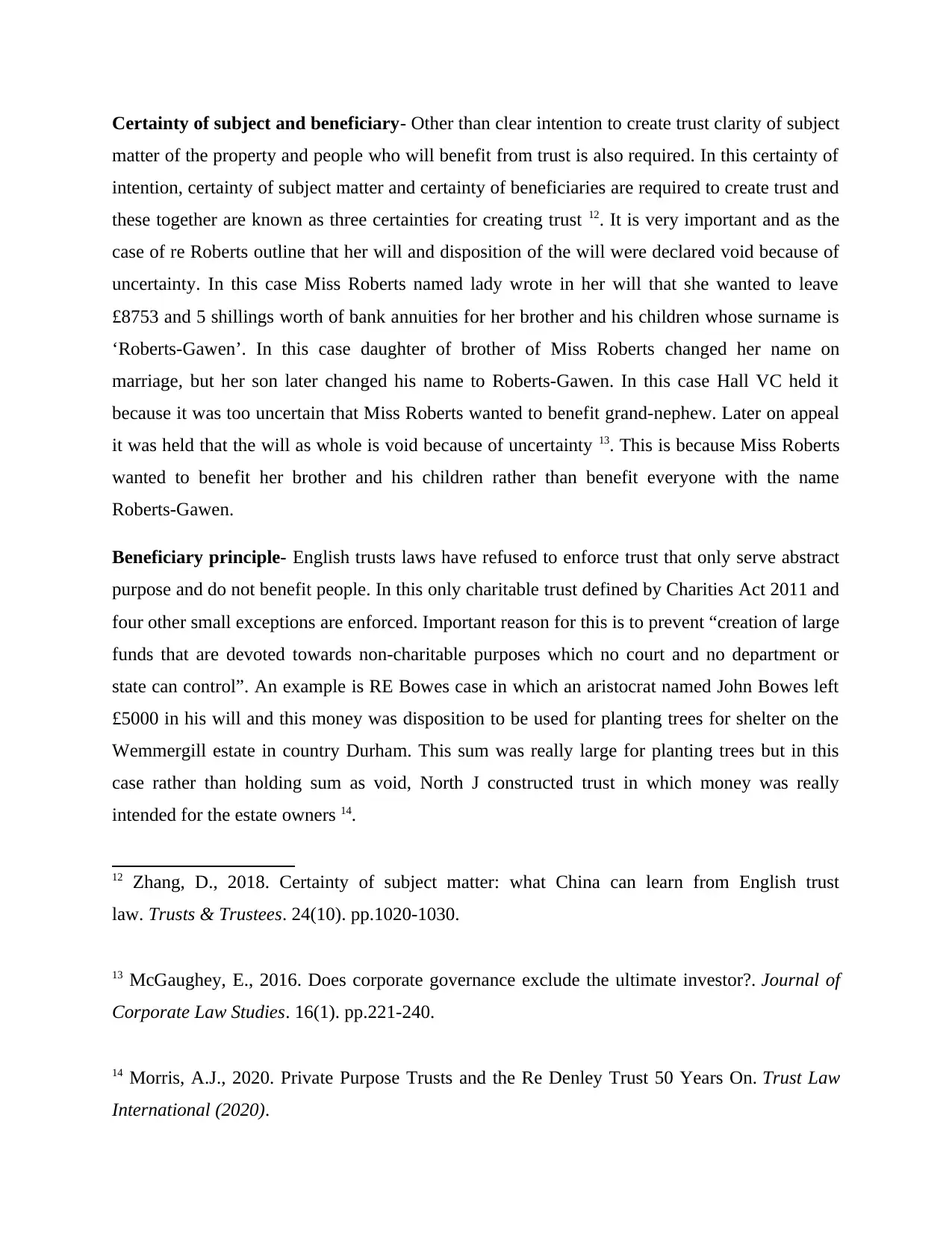
Certainty of subject and beneficiary- Other than clear intention to create trust clarity of subject
matter of the property and people who will benefit from trust is also required. In this certainty of
intention, certainty of subject matter and certainty of beneficiaries are required to create trust and
these together are known as three certainties for creating trust 12. It is very important and as the
case of re Roberts outline that her will and disposition of the will were declared void because of
uncertainty. In this case Miss Roberts named lady wrote in her will that she wanted to leave
£8753 and 5 shillings worth of bank annuities for her brother and his children whose surname is
‘Roberts-Gawen’. In this case daughter of brother of Miss Roberts changed her name on
marriage, but her son later changed his name to Roberts-Gawen. In this case Hall VC held it
because it was too uncertain that Miss Roberts wanted to benefit grand-nephew. Later on appeal
it was held that the will as whole is void because of uncertainty 13. This is because Miss Roberts
wanted to benefit her brother and his children rather than benefit everyone with the name
Roberts-Gawen.
Beneficiary principle- English trusts laws have refused to enforce trust that only serve abstract
purpose and do not benefit people. In this only charitable trust defined by Charities Act 2011 and
four other small exceptions are enforced. Important reason for this is to prevent “creation of large
funds that are devoted towards non-charitable purposes which no court and no department or
state can control”. An example is RE Bowes case in which an aristocrat named John Bowes left
£5000 in his will and this money was disposition to be used for planting trees for shelter on the
Wemmergill estate in country Durham. This sum was really large for planting trees but in this
case rather than holding sum as void, North J constructed trust in which money was really
intended for the estate owners 14.
12 Zhang, D., 2018. Certainty of subject matter: what China can learn from English trust
law. Trusts & Trustees. 24(10). pp.1020-1030.
13 McGaughey, E., 2016. Does corporate governance exclude the ultimate investor?. Journal of
Corporate Law Studies. 16(1). pp.221-240.
14 Morris, A.J., 2020. Private Purpose Trusts and the Re Denley Trust 50 Years On. Trust Law
International (2020).
matter of the property and people who will benefit from trust is also required. In this certainty of
intention, certainty of subject matter and certainty of beneficiaries are required to create trust and
these together are known as three certainties for creating trust 12. It is very important and as the
case of re Roberts outline that her will and disposition of the will were declared void because of
uncertainty. In this case Miss Roberts named lady wrote in her will that she wanted to leave
£8753 and 5 shillings worth of bank annuities for her brother and his children whose surname is
‘Roberts-Gawen’. In this case daughter of brother of Miss Roberts changed her name on
marriage, but her son later changed his name to Roberts-Gawen. In this case Hall VC held it
because it was too uncertain that Miss Roberts wanted to benefit grand-nephew. Later on appeal
it was held that the will as whole is void because of uncertainty 13. This is because Miss Roberts
wanted to benefit her brother and his children rather than benefit everyone with the name
Roberts-Gawen.
Beneficiary principle- English trusts laws have refused to enforce trust that only serve abstract
purpose and do not benefit people. In this only charitable trust defined by Charities Act 2011 and
four other small exceptions are enforced. Important reason for this is to prevent “creation of large
funds that are devoted towards non-charitable purposes which no court and no department or
state can control”. An example is RE Bowes case in which an aristocrat named John Bowes left
£5000 in his will and this money was disposition to be used for planting trees for shelter on the
Wemmergill estate in country Durham. This sum was really large for planting trees but in this
case rather than holding sum as void, North J constructed trust in which money was really
intended for the estate owners 14.
12 Zhang, D., 2018. Certainty of subject matter: what China can learn from English trust
law. Trusts & Trustees. 24(10). pp.1020-1030.
13 McGaughey, E., 2016. Does corporate governance exclude the ultimate investor?. Journal of
Corporate Law Studies. 16(1). pp.221-240.
14 Morris, A.J., 2020. Private Purpose Trusts and the Re Denley Trust 50 Years On. Trust Law
International (2020).
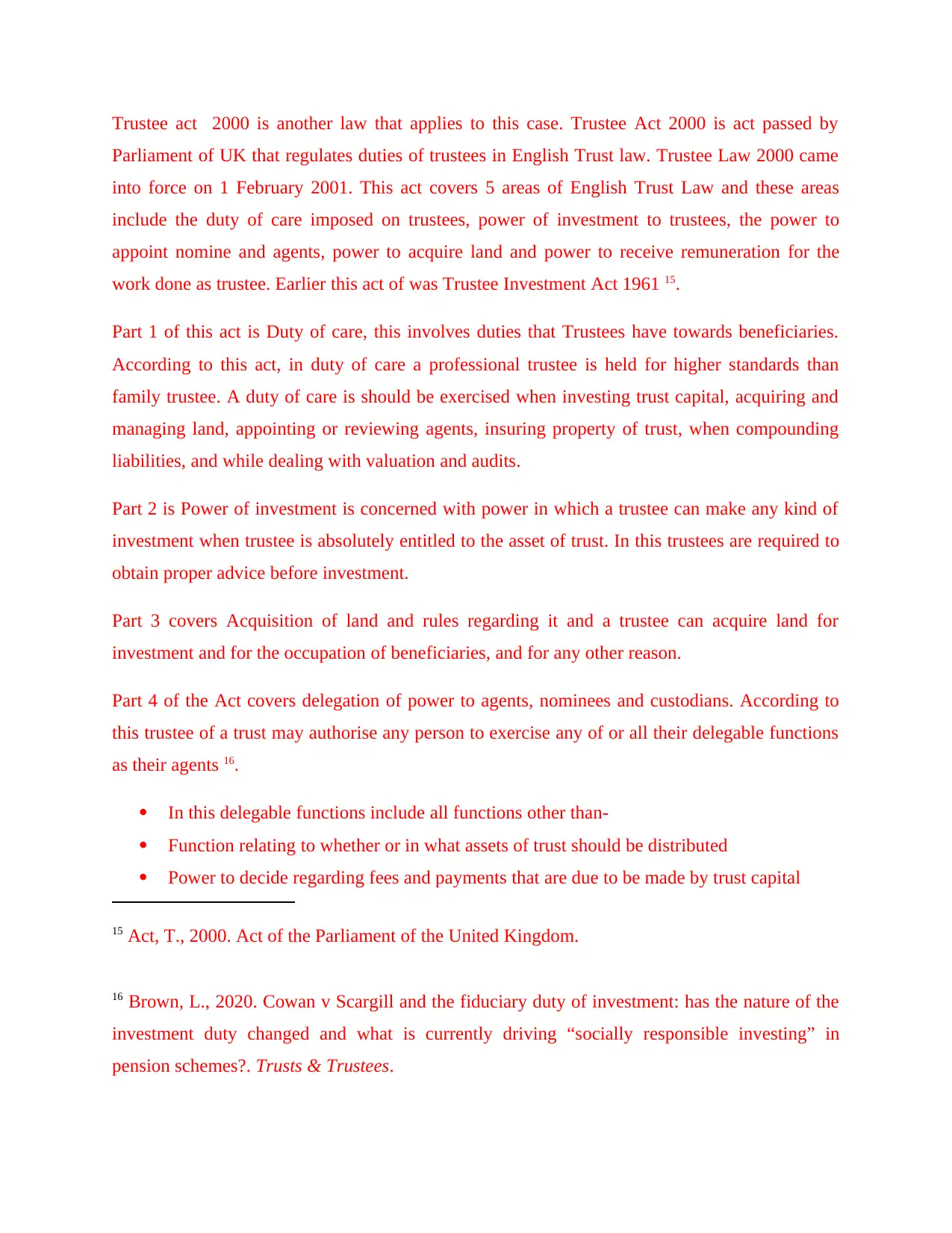
Trustee act 2000 is another law that applies to this case. Trustee Act 2000 is act passed by
Parliament of UK that regulates duties of trustees in English Trust law. Trustee Law 2000 came
into force on 1 February 2001. This act covers 5 areas of English Trust Law and these areas
include the duty of care imposed on trustees, power of investment to trustees, the power to
appoint nomine and agents, power to acquire land and power to receive remuneration for the
work done as trustee. Earlier this act of was Trustee Investment Act 1961 15.
Part 1 of this act is Duty of care, this involves duties that Trustees have towards beneficiaries.
According to this act, in duty of care a professional trustee is held for higher standards than
family trustee. A duty of care is should be exercised when investing trust capital, acquiring and
managing land, appointing or reviewing agents, insuring property of trust, when compounding
liabilities, and while dealing with valuation and audits.
Part 2 is Power of investment is concerned with power in which a trustee can make any kind of
investment when trustee is absolutely entitled to the asset of trust. In this trustees are required to
obtain proper advice before investment.
Part 3 covers Acquisition of land and rules regarding it and a trustee can acquire land for
investment and for the occupation of beneficiaries, and for any other reason.
Part 4 of the Act covers delegation of power to agents, nominees and custodians. According to
this trustee of a trust may authorise any person to exercise any of or all their delegable functions
as their agents 16.
In this delegable functions include all functions other than-
Function relating to whether or in what assets of trust should be distributed
Power to decide regarding fees and payments that are due to be made by trust capital
15 Act, T., 2000. Act of the Parliament of the United Kingdom.
16 Brown, L., 2020. Cowan v Scargill and the fiduciary duty of investment: has the nature of the
investment duty changed and what is currently driving “socially responsible investing” in
pension schemes?. Trusts & Trustees.
Parliament of UK that regulates duties of trustees in English Trust law. Trustee Law 2000 came
into force on 1 February 2001. This act covers 5 areas of English Trust Law and these areas
include the duty of care imposed on trustees, power of investment to trustees, the power to
appoint nomine and agents, power to acquire land and power to receive remuneration for the
work done as trustee. Earlier this act of was Trustee Investment Act 1961 15.
Part 1 of this act is Duty of care, this involves duties that Trustees have towards beneficiaries.
According to this act, in duty of care a professional trustee is held for higher standards than
family trustee. A duty of care is should be exercised when investing trust capital, acquiring and
managing land, appointing or reviewing agents, insuring property of trust, when compounding
liabilities, and while dealing with valuation and audits.
Part 2 is Power of investment is concerned with power in which a trustee can make any kind of
investment when trustee is absolutely entitled to the asset of trust. In this trustees are required to
obtain proper advice before investment.
Part 3 covers Acquisition of land and rules regarding it and a trustee can acquire land for
investment and for the occupation of beneficiaries, and for any other reason.
Part 4 of the Act covers delegation of power to agents, nominees and custodians. According to
this trustee of a trust may authorise any person to exercise any of or all their delegable functions
as their agents 16.
In this delegable functions include all functions other than-
Function relating to whether or in what assets of trust should be distributed
Power to decide regarding fees and payments that are due to be made by trust capital
15 Act, T., 2000. Act of the Parliament of the United Kingdom.
16 Brown, L., 2020. Cowan v Scargill and the fiduciary duty of investment: has the nature of the
investment duty changed and what is currently driving “socially responsible investing” in
pension schemes?. Trusts & Trustees.
⊘ This is a preview!⊘
Do you want full access?
Subscribe today to unlock all pages.

Trusted by 1+ million students worldwide
1 out of 18
Related Documents
Your All-in-One AI-Powered Toolkit for Academic Success.
+13062052269
info@desklib.com
Available 24*7 on WhatsApp / Email
![[object Object]](/_next/static/media/star-bottom.7253800d.svg)
Unlock your academic potential
Copyright © 2020–2025 A2Z Services. All Rights Reserved. Developed and managed by ZUCOL.
![LAW OF COMMERCE: Assessing Tanya's Role as Trustee - [University]](/_next/image/?url=https%3A%2F%2Fdesklib.com%2Fmedia%2Fimages%2Fmt%2Fb82ae867970e450c8f1c8afb9669228f.jpg&w=256&q=75)




